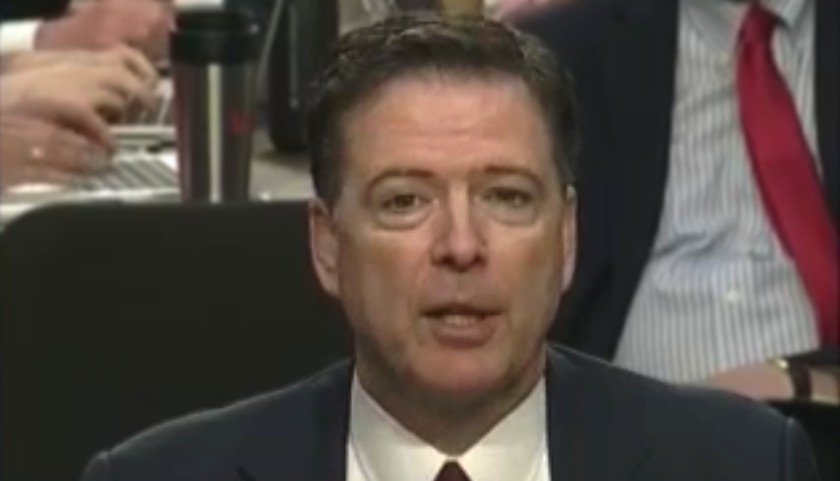by Robert Donachie
Former FBI Director James Comey hired the lawyer who represented Michigan State University in its investigation into shamed sports doctor Larry Nassar to join his legal team.
Comey hired Patrick Fitzgerald, former U.S. attorney, in May 2017, Talking Points Memo first reported Tuesday afternoon. Fitzgerald’s name was floated as a possible Comey attorney during the former FBI director’s testimony on Capitol Hill in the Summer of 2017, which Tuesday’s report now corroborates.
Fitzgerald and Comey have been “close friends” for over three decades. The pair cut their teeth together in the 1980s in the Southern District of New York’s U.S. Attorney’s Office and knew each other before that. Comey’s child even has the honor of calling Fitzgerald “godfather.”
While Fitzgerald is known for winning big, national cases — like prosecutions of now-pardoned “Scooter” Libby, Abdel Rahman, and other terrorists, including Osama bin Laden — he is best known in recent years for his representation of Michigan State while it investigated Nassar, a man who was convicted this year of molesting over 150 young women while he was a doctor at the university and for the national gymnastics team.
The attorneys who represented Nassar’s victims in the case believe Fitzgerald used his clout as a well-known and respected attorney to shield Michigan State from criticism.
Fitzgerald was hired in 2016 to deal with the Nassar investigation and with any litigation against the university, The New York Times reports. He was paid an hourly rate of up to $990 and has reportedly billed the university for roughly $4.4 million.
The contract, which was first obtained by The Detroit News, shows that Fitzgerald was hired to protect Michigan State from lawsuits filed on the part of Nassar’s victims.
The contract reads:
As described to us, the (e)ngagement involves assisting the (u)niversity to coordinate its response to the allegations of misconduct concerning Dr. Larry Nasser. This will include facilitating cooperation with appropriate law enforcement and regulatory authorities concerning Dr. Nassar, counseling on any internal reviews conducted to make sure they are carried out in a matter that will best assist the University’s response and will not compromise any law enforcement or regulatory actions concerning Dr. Nassar, and providing assistance in anticipation of and with respect to any civil litigation that may arise
The allegations against Fitzgerald stem from a letter he sent to Michigan’s attorney general in December 2017 in which he claimed no one believed the reports against Nassar until they showed up in the media in 2016. Essentially, he claimed ignorance on the part of Michigan State officials.
“While many in the community today wish that they had identified Nassar as a predator, we believe the evidence in this case will show that no one else at M.S.U. knew that Nassar engaged in criminal behavior,” Fitzgerald wrote in the letter to Michigan Attorney General Bill Schuette.
“Even after reports of sexual abuse surfaced in the press and MSU fired Nassar, many in the community strongly disbelieved the allegations,” Fitzgerald wrote.
The trouble with Fitzgerald’s statements about an apparent lack of belief or knowledge on the part of Michigan State is that university officials first heard the then-allegations against Nassar decades before newspapers started printing the story in 2016.
That also comes into conflict with a 2014 Title IX review the university conducted after a woman complained that Nassar had inappropriately touched her. A handful of other women claimed in lawsuits that they reported Nassar sexually abused them to coaches, trainers and university counselors as far back as the late 1990s.
Schuette announced an investigation into Michigan State University at a late January press conference, calling the Michigan State University boards’ conduct into question during the Nassar investigation. The press conference came days after Nassar was sentenced to 40 to 175 years for molesting the young women.
WATCH:
“Now the MSU board of trustees asked the department of Attorney General to conduct an investigation. I am and I have been. Let me also add this: I don’t need advice from the board of trustees at MSU about how to conduct an investigation,” Schuette said. “Frankly they should be the last ones to be providing advice given their conduct throughout this entire episode. Their conduct throughout this entire episode speaks for itself.”
“It has become abundantly clear that a full and complete investigation of what happened at Michigan State University from the president’s office down is required,” Schuette said.
– – –
Robert Donachie is a reporter at The Daily Caller News Foundation Follow Robert Donachie on Twitter and Facebook.





